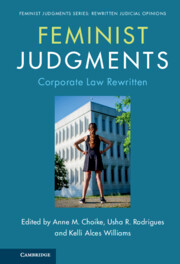Book contents
- Feminist Judgments: Corporate Law Rewritten
- Feminist Judgments Series Editors
- Advisory Panel for Feminist Judgments Series
- Feminist Judgments: Corporate Law Rewritten
- Copyright page
- Dedication
- Contents
- Advisory Panel for Feminist Judgments: Corporate Law Rewritten
- Notes on Contributors
- Acknowledgments
- About the Cover Art
- Table of Cases
- Part I Introduction and Overview
- Part II Legal Personality, Identity, and Limited Liability of Corporate Entities
- 2 Commentary on Citizens United v. Federal Election Commission
- 3 Commentary on Walkovszky v. Carlton
- Part III Role and Purpose of the Corporation and Corporate Combinations in Society
- Part IV Fiduciary Duties in Corporate Governance
- Part V Closely Held Businesses and Other Considerations Regarding the Composition of Boards, Management, and Owners
- Part VI Protecting Investors and Potential Investors in Corporations
- Part VII From Foundations to Future Directions
- Index
3 - Commentary on Walkovszky v. Carlton
from Part II - Legal Personality, Identity, and Limited Liability of Corporate Entities
Published online by Cambridge University Press: 15 January 2023
- Feminist Judgments: Corporate Law Rewritten
- Feminist Judgments Series Editors
- Advisory Panel for Feminist Judgments Series
- Feminist Judgments: Corporate Law Rewritten
- Copyright page
- Dedication
- Contents
- Advisory Panel for Feminist Judgments: Corporate Law Rewritten
- Notes on Contributors
- Acknowledgments
- About the Cover Art
- Table of Cases
- Part I Introduction and Overview
- Part II Legal Personality, Identity, and Limited Liability of Corporate Entities
- 2 Commentary on Citizens United v. Federal Election Commission
- 3 Commentary on Walkovszky v. Carlton
- Part III Role and Purpose of the Corporation and Corporate Combinations in Society
- Part IV Fiduciary Duties in Corporate Governance
- Part V Closely Held Businesses and Other Considerations Regarding the Composition of Boards, Management, and Owners
- Part VI Protecting Investors and Potential Investors in Corporations
- Part VII From Foundations to Future Directions
- Index
Summary
The plaintiff, John Walkovsky, was struck by a taxi owned by Seon Cab Corporation while walking in New York City. Seon Cab Corp. was one of the ten cab companies owned by a group of shareholders, including William Carlton. The case highlights the harms visited on innocent parties by limited liability and shareholders’ focus on profit. A feminist rewrite would examine the costs visited upon vulnerable groups such as tort victims with limited access to the legal system, children who are likely to be more severely injured if harmed by corporate activity or by the loss of a parent so injured, and immigrants and lower-income Americans who may not have health insurance to cover the physical harms caused by corporate business. Intentional undercapitalization of corporations and an adherence to minimum insurance requirements externalizes the costs of doing business onto the rest of society. This externalization of costs is particularly harmful when it causes physical injury or death to portions of the population who cannot absorb the costs ducked by the corporation. A feminist perspective could consider the interests of these vulnerable populations in designing a limited liability doctrine that encourages entrepreneurial risk-taking while balancing it against the cost of significant corporate externalities.
Keywords
- Type
- Chapter
- Information
- Feminist Judgments: Corporate Law Rewritten , pp. 62 - 88Publisher: Cambridge University PressPrint publication year: 2023

